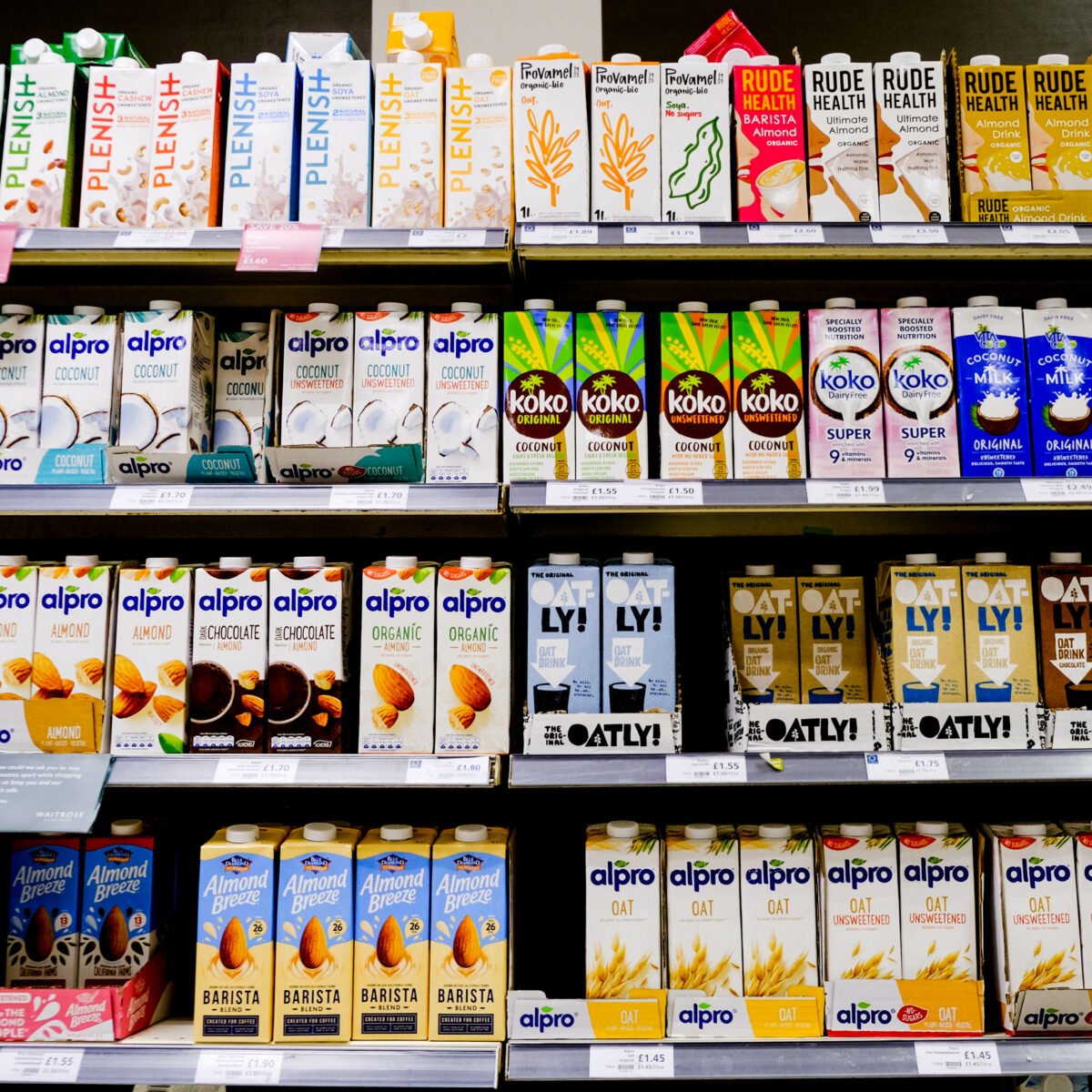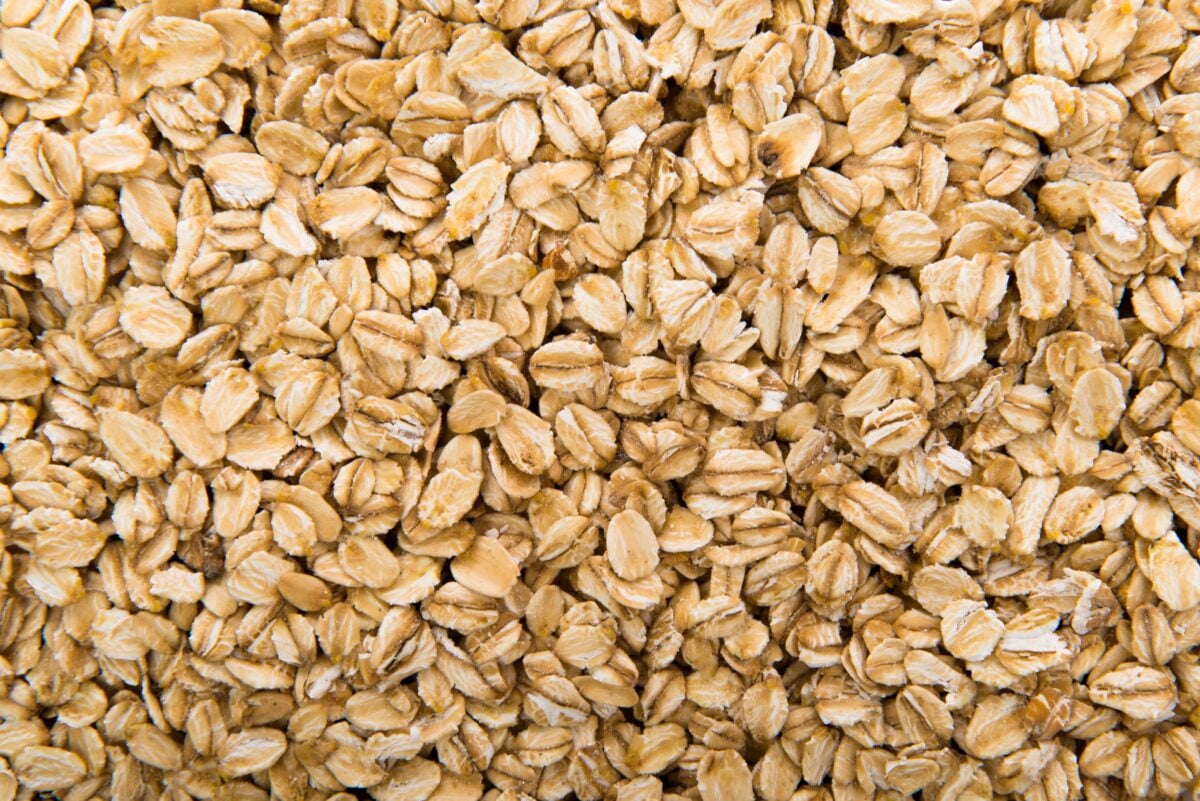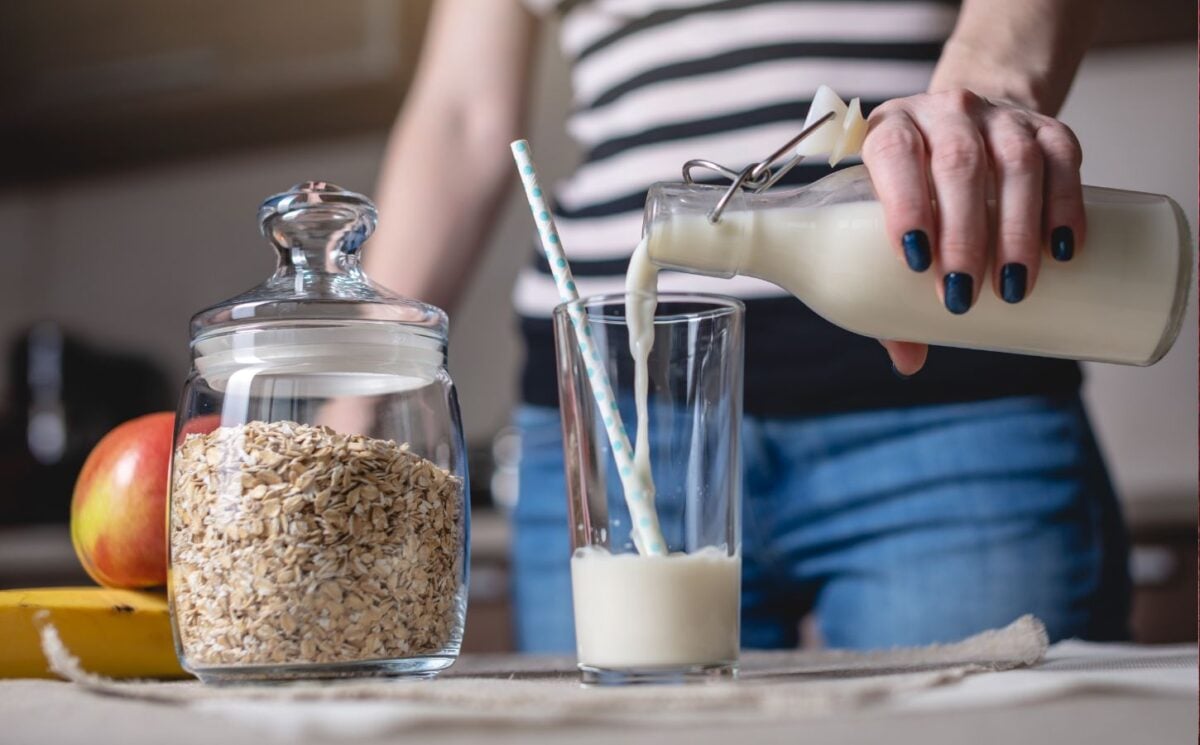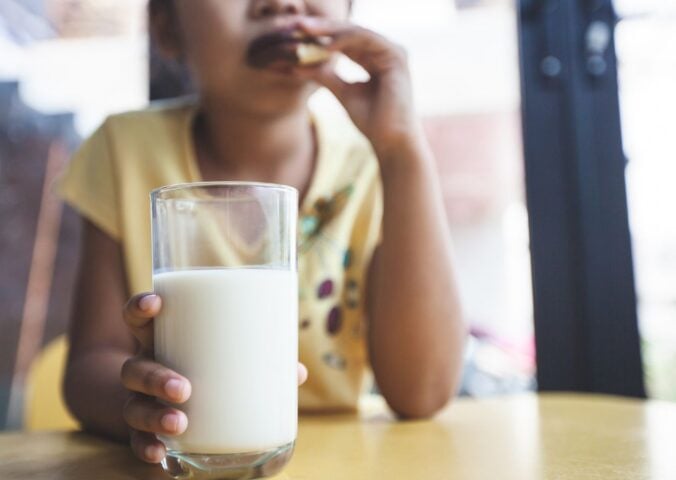Oat milk is under attack. A recent slew of articles in magazines and newspapers have questioned the health and environmental credentials of the milk alternative. Some have even pronounced the reign of oat milk to be over.
Oat milk has become one of the most popular of the plant-based milk options. Despite what the media has been saying, the global oat milk industry looks set to keep growing. By 2033, it is expected be worth USD $5.6 billion – a compound annual growth rate of 13.7 percent.
So is there actually reason to worry about the impact your oat milk latte is having on your health? And what about the claims that it’s worse for the environment than we thought? Here, we separate the wheat from the chaff on the dairy-free milk.
What is the media saying about oat milk?
The media criticisms of oat milk have come about in the wake of a TikTok video posted by actor Andrea Valls. In the video, “Cow’s milk when she hears you’ve quit oat,” Valls plays the role of cow’s milk as though it is a woman who has been dumped for another, “oat milk.”
The video mentions oat milk “spiking your glucose” and being “bad for the environment” – and the media has jumped on it.
Health worries
Outlets have been reporting that oat milk may not be as healthy as people think it is. They say that nutritionists have come out against the drink because it supposedly causes spikes in blood sugar.
The worry is about the glucose content of oats. Oats are a carbohydrate, which turns to sugar when it breaks down in your body. “The high starch content in oats breaks down into glucose in the gut, passing into the bloodstream as glucose and raising blood sugar,” one nutritionist told an online magazine. The article’s author then warns that “these blood sugar spikes, over time, can contribute to a diabetes risk.”
Over on TikTok, people have been claiming that oat milk has made them feel bloated, and that due to its high glycemic index it causes acne. Another nutritionist told another publication that by potentially raising blood glucose levels, it could cause inflammation. She also says that drinking oat milk in large quantities or very quickly can cause gas and bloating.
Another claim is that oat milk has lower nutritional value than cow’s milk, and that drinking it is depriving people of protein and essential nutrients.
Environmental claims
The environmental impact of dairy is one of the reasons that more people have swapped it for less damaging plant-based alternatives. But the recent media articles on oat milk have questioned whether oat milk really is more environmentally friendly.
One claim is that oat milk’s green credentials depend on how the oats are grown, while cow’s milk isn’t so bad if it’s produced the right way. “It’s not the cow, it’s the how,” one newspaper quotes a lifestyle journalist as saying. She adds that buying milk “from an organic or regenerative dairy farm” can be “beneficial for the environment and biodiversity” and store carbon in the soil.
One publication cites Jayne Buxton’s 2022 book The Great Plant-Based Con as evidence of oat milk’s environmental harms. “[W]hen the metric used is CO2 per micronutrient content, the footprint of dairy milk is less than a third of that of oat milk,” the article says.
But how true is what’s written about oat milk?
Is oat milk actually that unhealthy?

Blood sugar
The amount of carbohydrates in a cup of oat milk is about 15 grams – equivalent to a slice of bread, as reported here. This actually isn’t much more than what’s in cow’s milk, a cup of which has about 13g of carbohydrates. The important difference is the ratio of carbohydrates to protein.
“Oat milk has a higher glycaemic index (GI) than dairy and some other dairy alternatives such as soya milk,” Emily McKee, Dietitian at the Vegan Society, tells Plant Based News. “This is generally not because of a higher total carbohydrate content on average, but instead due to its lower protein content which means the carbohydrates in oat milk are digested more rapidly.”
But this isn’t something to worry about too much. “Ups and downs in our blood sugar levels are a very normal physiological response to eating and drinking,” says McKee. “If you do not have a diagnosis of diabetes, insulin prevents your blood sugars from ‘spiking’ too high, no matter what food you have eaten. With this in mind, the carbohydrate content of oat milk ‘spiking’ blood sugar is not something that the majority of people should have any concerns about.”
Most people are likely to be consuming oat by splashing some in their coffee or having it on cereal, rather than guzzling huge amounts. But even if they were, it would not be particularly problematic. “Even if you drink a much larger amount, your body will simply compensate to keep your blood sugar regulated by producing more insulin,” says McKee.
Acne
There is not much consensus over the degree to which different foods contribute to acne, nor on which foods should be avoided to get clear skin. Some studies have linked the consumption of dairy to acne. These suggest that people who drink milk, and more of it, are more likely to have acne than those who don’t. This may be due to the hormones and proteins that are naturally found in milk. But researchers warn that these studies do not establish that dairy actually causes acne.
As for oat milk, there are no studies backing up claims that it causes acne; the evidence is anecdotal. Equally, there is mostly anecdotal evidence that giving up dairy makes acne disappear. Ultimately, it’s very difficult to pinpoint either oat milk or dairy as contributing to acne, as there may be other things in a person’s diet that are doing this too.
“Whilst some evidence suggests that a diet containing high amounts of sugar and fat might be linked to acne, the sugar content of oat milk is actually relatively low,” says McKee. “At 3.4g per 100ml for sweetened varieties, it falls within the definition of a low sugar food which is less than 5g per 100g. Unsweetened and no sugar varieties are also available which have 0g sugar per 100ml.”
Bloating
When it comes to bloating, it’s unlikely that oat milk is the cause for most people. One nutritionist blamed the sugar, carb, and fiber content of oat milk, but added that people who are bloating from it may be drinking too much of it or drinking it too fast.
Consuming too much fiber is known to cause gas and bloating. In 100ml of oat milk there is about 0.8g of fiber; the recommended amount for adults is about 30g a day. Most people only get about 20g a day, according to the NHS.
“For individuals with Irritable Bowel Syndrome (IBS) who react specifically to substances called ‘FODMAPs‘ the types of fiber and sugar in oat milk may cause symptoms such as bloating, but for the general population the fiber content of oat milk is not likely to cause gastrointestinal symptoms,” says McKee.
Is oat milk less nutritious than cow’s milk?
The health arguments made in favor of cow’s milk is that it naturally contains protein, calcium, and other nutrients. In 100ml of whole cow’s milk there is about 3.5g of protein, 7 percent of your recommended daily intake (RDI) of vitamin B12, 124mg of calcium (17 percent RDI), and 21 percent RDI of iodine.
But whole cow’s milk also contains 2.4g of saturated fats and 4.7g of sugar per 100ml, and no fiber at all. According to Harvard’s health blog, the health benefits of milk “may be weakened by whole milk’s high saturated fat content. It adds that “a high intake of any type of milk can lead to weight gain due to the extra calories.”
Fortification
Many oat milk brands are fortified with nutrients including calcium and B12 in comparable amounts to cow’s milk. “A quick glance at the back of pack labelling will help identify these additional nutrients,” says McKee. “The exception is organic varieties, which are not fortified so do not contribute to meeting your daily calcium requirements as a dairy alternative, and this should be considered in overall dietary planning.”
One recent study found that appropriately fortified plant-based dairy alternatives contain sufficient levels of important vitamins and minerals comparable to dairy milk.
The fiber content of oat milk is also an advantage. “Oats specifically contain beta-glucan, a soluble fiber that forms a gel-like substance in our guts,” says McKee. “Beta-glucan is a prebiotic, acting as a food source for beneficial bacteria species in our colon.”
It’s true that oat milk is not a great source of protein – but this doesn’t mean you need to start drinking dairy milk. Soy and pea milk are recommended by nutritionists as the best options for high-protein plant-based milk alternatives. Soy milk contains nearly as much protein as dairy, and pea milk actually surpasses it, while containing lower amounts of carbs, sugar, and saturated fat. Or you could simply get your protein from the wide variety of plant-based protein food sources.
Environmental impact

Herbicide use
Some reports on oat milk’s “fall from grace” have flagged the potential for the oats to be grown using glyphosate. The herbicide – which is commonly sold as Round Up for at-home use – kills many types of grasses and “weeds.” The World Health Organization declared it carcinogenic in 2015, and it is known to harm bee health.
Oatly says its products are free of glyphosate. A test of 13 different oat milk brands in the US found traces of glyphosate in only two of them made by MALK and Silk.
The agricultural use of pesticides is increasing globally – but the main driver is growing feed for farmed animals.
“It’s not the cow, it’s the how”
The claim that milk and meat from cows is actually beneficial to the environment if they are farmed “regeneratively” does not stand up to scrutiny. There is little evidence supporting the claim, but mounting evidence that regenerative grazing does not effectively store carbon in soils long-term. In addition, research shows that grazing cows to produce meat or milk is worse for biodiversity than removing them from the land.
One of the reasons oat milk has a much lower environmental impact than cow’s milk is that it uses significantly less land. Freeing up agricultural land through plant-based dietary shifts is key for large-scale nature restoration.
Accounting tricks
Jayne Buxton’s claim that if you look at carbon dioxide emissions per micronutrient content, cow’s milk has a third the carbon footprint of oat milk is dubious.
It’s true that cow’s milk produces fewer emissions per gram of protein, because it has a higher protein content than oat milk. But as sustainability expert Andrew Berardy has pointed out, the comparison only holds if people are trying to match the protein of cow’s milk through their oat milk consumption. “Unless you can convincingly argue that people drink oat milk for its protein content, it’s not fair to compare it to dairy milk on that basis,” he told Newsweek.
For those swapping dairy for plant-based alternatives who are concerned about their protein, soy and pea milk are a better option.
For other environmental metrics, including freshwater use and eutrophication caused by nutrients from manure running into water bodies, oat milk – and all plant-based milks – still beat dairy by a long way.
Other reasons for ditching dairy
Quite aside from questions of health and environmental impacts, one major benefit of plant-based milks is that they do not involve farming animals.
The dairy industry involves many practices that cause cows either physical or mental distress or both. Among them is the forcible impregnation of cows multiple times over their “productive” lives. Their calves are then taken away from them shortly after birth. Indeed, cow-calf separation is one of the most contentious elements of the industry, with many people finding the practice cruel.
In many countries, unwanted male dairy calves are either shot shortly after birth or exported abroad to be reared for meat. These journeys can last days and are extremely gruelling and traumatic for young calves.
In the media backlash characterizing oat milk and other plant-based foods as “unhealthy,” it is important to remember that veganism is not about health. It is an ethical choice to avoid contributing to non-human animal exploitation. This applies to food, clothes, or any other products made with animals, as well as most activities relying on animal captivity.






